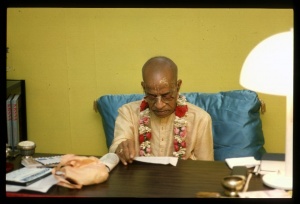SB 4.9.65

A.C. Bhaktivedanta Swami Prabhupada
TEXT 65
- uttānapādo rājarṣiḥ
- prabhāvaṁ tanayasya tam
- śrutvā dṛṣṭvādbhutatamaṁ
- prapede vismayaṁ param
SYNONYMS
uttānapādaḥ — King Uttānapāda; rāja-ṛṣiḥ — great saintly king; prabhāvam — influence; tanayasya — of his son; tam — that; śrutvā — hearing; dṛṣṭvā — seeing; adbhuta — wonderful; tamam — in the superlative degree; prapede — happily felt; vismayam — wonder; param — supreme.
TRANSLATION
The saintly King Uttānapāda, hearing of the glorious deeds of Dhruva Mahārāja and personally seeing also how influential and great he was, felt very satisfied, for Dhruva's activities were wonderful to the supreme degree.
PURPORT
When Dhruva Mahārāja was in the forest executing his austerities, his father, Uttānapāda, heard everything about his very wonderful activities. Although Dhruva Mahārāja was the son of a king and was only five years old, he went to the forest and executed devotional service under strict austerity. Therefore his acts were all wonderful, and when he came back home, naturally, because of his spiritual qualifications, he became very popular amongst the citizens. He must have performed many wonderful activities by the grace of the Lord. No one is more satisfied than the father of a person who is credited with glorious activities. Mahārāja Uttānapāda was not an ordinary king; he was a rājarṣi, a saintly king. Formerly this earth was ruled by one saintly king only. Kings were trained to become saintly; therefore they had no other concern than the welfare of the citizens. These saintly kings were properly trained, and as mentioned in Bhagavad-gītā also, the science of God, or the yoga system of devotional service known as Bhagavad-gītā, was spoken to the saintly king of the sun planet, and gradually it descended through the kṣatriya kings who were generated from the sun and the moon. If the head of the government is saintly, certainly the citizens become saintly, and they are very happy because both their spiritual and physical needs and hankerings are satisfied.